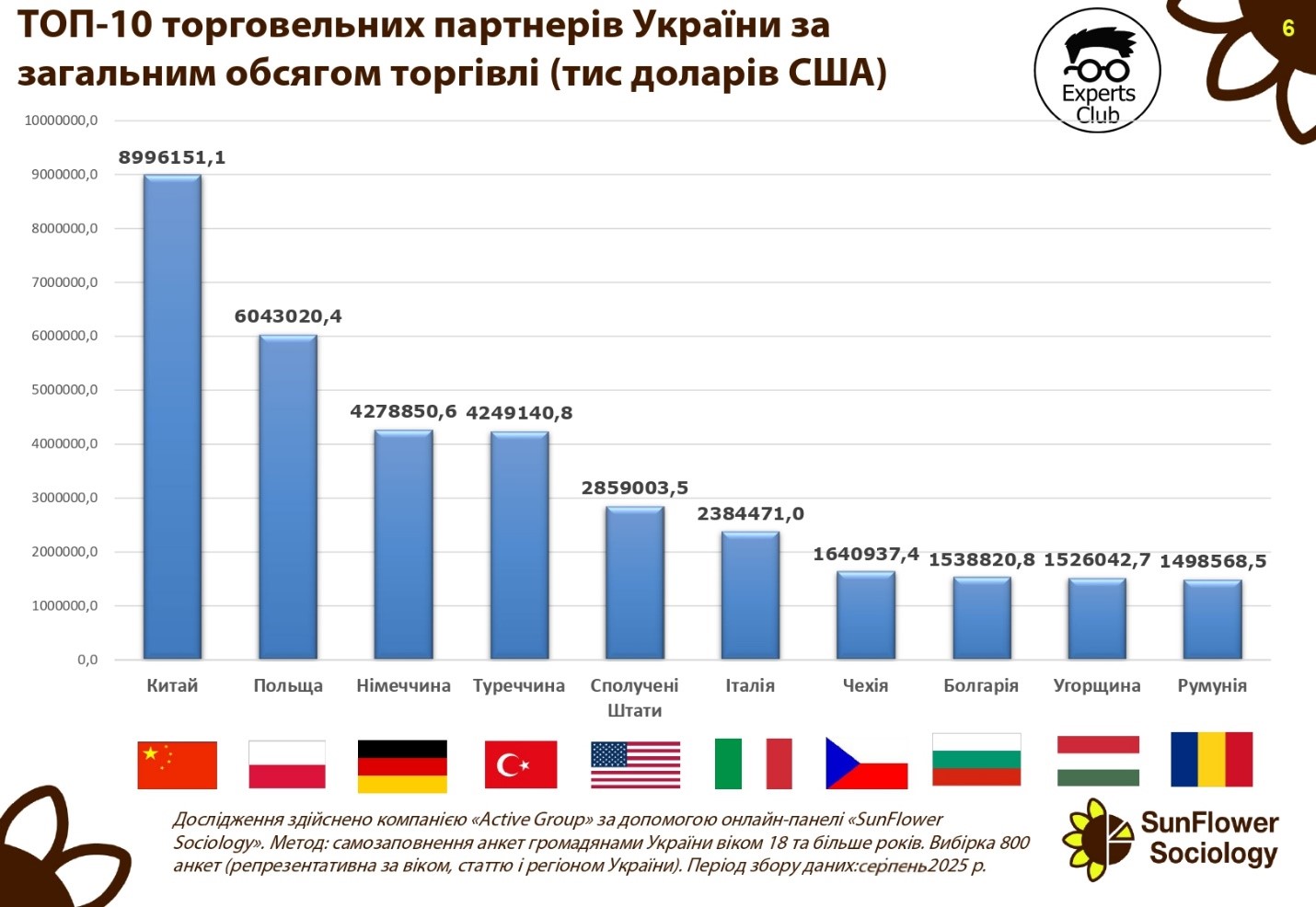
Citizens of Ukraine and Russia are among the top ten foreign buyers of housing in Bulgaria in 2024–2025, according to a study by the Experts Club analytical center and data from the Bulgarian Real Estate Association.
According to the study, the top 10 countries whose citizens are most active in buying real estate in Bulgaria are: Great Britain, Germany, Greece, Israel, Romania, Turkey, Italy, Russia, Ukraine, and Poland.
Foreigners account for a significant share of transactions in the housing market. According to one international analytical resource, the number of foreign buyers of residential real estate in Bulgaria in 2024-2025 has increased by approximately 18%, and the overall market is showing steady price growth. According to local experts, the percentage of foreigners in some coastal projects may reach 30% of the total number of buyers.
Foreign buyers are most interested in properties on the Black Sea coast – in Varna, Burgas, and Nessebar – as well as in the mountain resorts of Bansko and Pamporovo, where real estate is considered both for personal use and as an investment for rental.
Analysts note that Ukrainians have firmly established themselves in the top 10 due to a combination of relocation and investment demand: some buyers view Bulgaria as a safe EU jurisdiction during the war, while others see it as an opportunity to earn income from renting out property in tourist regions.
The growth in foreign demand is supporting price increases: over the past year, the cost of housing in Bulgarian seaside resorts has risen by an average of 8-10%, and in Sofia by 7-10%.
At the same time, according to estimates by the European Commission and a number of analytical reviews, housing in Bulgaria in 2025 is overvalued by approximately 10-15% relative to fundamental indicators, but experts are not yet talking about a critical “bubble” in the market.
In the next 2–3 years, Experts Club analysts expect foreigners to keep showing interest in Bulgarian real estate, but with a change in the demand structure: they estimate that the share of buyers from the EU, Ukraine, and Israel will grow, while the role of Russian buyers in new deals may continue to decline amid sanctions and capital movement restrictions.
According to data from the National Statistical Institute of Bulgaria and international reviews, in the second half of 2024, housing prices in the country rose by 15% year-on-year and by 87% compared to 2015. At the same time, the average price per square meter in the country remains significantly lower than in most EU countries, making Bulgaria one of the most affordable real estate markets in the Union for foreign investors.
Russian citizens traditionally account for a significant share of owners, especially on the coast. According to Bulgarian sources, in the Burgas region alone, more than 5,200 properties owned by Russians are officially registered, while across the country as a whole, there are several tens of thousands of properties. At the same time, in recent years, the share of new purchases by Russians has been declining, and some of the properties are being put on the market and bought by Bulgarian and Western European buyers.
Source: https://expertsclub.eu/rynok-zhytla-bolgariyi-analiz-vid-experts-club/

PJSC “Ukrstal Construction” (Kiev) is interested in becoming a participant of infrastructure projects in Bulgaria, the company’s management said during a working meeting with the Deputy Minister of Economy and Industry of the Republic of Bulgaria Doncho Barbalov within the framework of a visit to this country as part of the Ukrainian business delegation.
According to the press release, Barbalov emphasized that Ukraine is an important economic partner of Bulgaria and that the Bulgarian Ministry of Economy and Industry attaches great importance to the development of bilateral economic relations, seeking to expand them.
The participants of the meeting discussed the prospects of investment cooperation, industrial clusters and industrial zones in Bulgaria, paid attention to practical aspects of cooperation within the framework of the North-South transport corridor and the possibility of municipal investment programs. At the same time, representatives of Ukrstal demonstrated to the Bulgarian management and representatives of Bulgarian business its production capacities and its own realized projects in metallurgical, energy, oil and gas industries, infrastructure and commercial construction, construction of logistics hubs, told about the achievements and the possibility of further expansion of its own industrial parks on the basis of our plants.
“The leaders of ”Ukrstal Construction“ expressed great interest and willingness to become reliable and experienced partners of construction, energy, industrial and logistics companies in Bulgaria in the creation of transport and logistics corridors, the implementation of infrastructure facilities – bridges, terminals, airports, modernization of energy, the introduction of innovative technologies, in commercial construction,” – stated in a press release.
The Deputy Minister of Economy expressed hope that as a result of the delegation’s visit to Bulgaria concrete projects will be realized, and the Ministry of Economy and Industry will remain available to provide assistance within its competences.
As part of the program of visits on November 12-18, working meetings of the company’s management were also held in the National Assembly (Parliament) of the Republic of Bulgaria, in the Ministry of Transport and Communications, the Ministry of Energy, the Chamber of Commerce and Industry, with the municipality and the management of the Port of Burgas.
Investment opportunities, state incentives and presentation of Ukrainian initiatives, creation of industrial parks and hubs were the main topics of meetings with the Agency for Management of Industrial Zones in Bulgaria and with the Bulgarian Investment Agency, the press release said.
PJSC “Ukrstal Construction” (Kiev) is the managing company of a group of plants, including metal construction plants “Ukrstal Dnipro”, “Ukrstal Zhytomyr”, “Ukrstal Zaporizhzhya” and experimental-mechanical plant “Metalist”. The main type of economic activity is production of building metal structures and parts of structures.
According to NDU data for the third quarter of 2025, JSC “Closed non-diversified venture corporate investment fund ‘Rift’ owns 99.6116% of shares of PJSC ”Ukrstal Construction”. The ultimate beneficiary (controller) of the fund is listed as Vitaliy Haiduk.

According to Serbian Economist, the average annual salary of full-time employees in the EU in 2024 was €39,800, which is 5.2% higher than in 2023, according to Eurostat.
The highest average salaries were recorded in Luxembourg (€82,969), Denmark (€71,565), and Ireland (€61,051).
The lowest figures were in Bulgaria (€15,387), Greece (€17,954), and Hungary (€18,461).
The full list for EU countries in 2024 is as follows:
Luxembourg — €82,969;
Denmark — €71,565;
Ireland — 61,051;
Belgium — 59,632;
Austria — 58,600;
Germany — 53,791;
Finland — 49,428;
Sweden — 46,525;
France — 43,790;
Slovenia — 35,133;
Spain — 33,700;
Italy — 33,523;
Malta — 33,499;
Lithuania — 29,104;
Cyprus — 27,611;
Estonia — 26,546;
Portugal — 24,818;
Czech Republic — 23,998;
Croatia — 23,446;
Latvia — 22,262;
Poland — 21,246;
Romania — 21,108;
Slovakia — 20,287;
Hungary — 18,461;
Greece — 17,954;
Bulgaria — 15,387.
https://t.me/relocationrs/1760

Ukrainian one-dollar store chain Aurora plans to start operations in Bulgaria by opening test locations within the next six months, co-founder and CEO Taras Panasenko said in an interview with NV.Business.
According to Panasenko, the choice of Bulgaria is due to logistics: the chain is already developing its business in Romania and can deliver from its Romanian warehouse without crossing the EU’s external customs border.
Current geography of operations. Aurora operates in Ukraine and Romania. The first store in Romania opened in October 2023, and the chain is expanding rapidly. In July 2025, it announced the opening of its 50th store in the country (the first in Bucharest).
The company had also previously announced plans to enter Moldova, but there are currently no reports of it starting operations there.
Aurora is a Ukrainian multi-format chain of inexpensive everyday goods that has been expanding internationally since 2023, starting with Romania.

In terms of total trade volume, Ukraine cooperates most closely with China, Poland, and Germany. These countries form the basis of the state’s foreign economic relations, exerting a critical influence on imports and exports.
China remains the leader with a total trade volume of $8.99 billion. Poland ranks second with $6.04 billion, while Germany and Turkey are almost equal with $4.28 billion and $4.25 billion, respectively. The United States ranks fifth with $2.86 billion.

The top 10 also includes Italy ($2.38 billion), the Czech Republic ($1.64 billion), Bulgaria ($1.54 billion), Hungary ($1.53 billion), and Romania ($1.50 billion).
“The top ten partners form the basis of Ukraine’s foreign trade balance. China and the EU countries account for the largest volumes of trade, but it is important to take into account the significant negative balance in relations with these countries,” said Maksim Urakin, founder of Experts Club and economist.
He added that although the large volume of trade indicates Ukraine’s integration into global supply chains, dependence on imports from China and Europe creates strategic risks.
“Poland and Germany are key hubs for Ukrainian exports, but at the same time they are significant sources of imports. Therefore, it is critically important to balance trade flows, preserving positive sectors such as agriculture and metallurgy, and reducing dependence on critical imports,” Urakin noted.
BULGARIA, CHINA, CZECH REPUBLIC, ECONOMY, EXPERTS CLUB, FOREIGN TRADE, GERMANY, HUNGARY, ITALY, POLAND, ROMANIA, TURKEY, UKRAINE, USA, МАКСИМ УРАКИН

Foreigners are actively buying housing in Bulgaria, forming a significant share of transactions in the real estate market, according to local specialized associations and agencies.
According to the Bulgarian Real Estate Association, in 2024-2025 the greatest interest is shown by citizens of the UK, Germany, Greece, Israel, Romania and Ukraine. The most demanded objects on the Black Sea coast (Varna, Burgas, Nessebar) and in mountain regions popular for winter tourism (Bansko, Pamporovo).
Top 10 countries of real estate buyers in Bulgaria (2024-2025):
UK
Germany
Greece
Israel
Romania
Turkey
Italy
Russia
Ukraine
Poland
Experts note that the demand of foreigners stimulates the growth of prices: over the year the cost of housing in seaside resorts increased by 8-10% on average, in Sofia – by 6-7%. Apartments in new buildings in the middle segment (from €60 thousand), as well as apartments for rent to tourists remain popular.
Ukrainians are firmly entrenched in the top ten foreign buyers: their interest is due to both temporary relocation because of the war, and investment motives – the possibility of renting out housing in resort cities.
At the same time analysts predict further growth of demand from citizens of Ukraine and Israel, as well as revival of interest from EU countries, where housing prices are much higher than in Bulgaria.